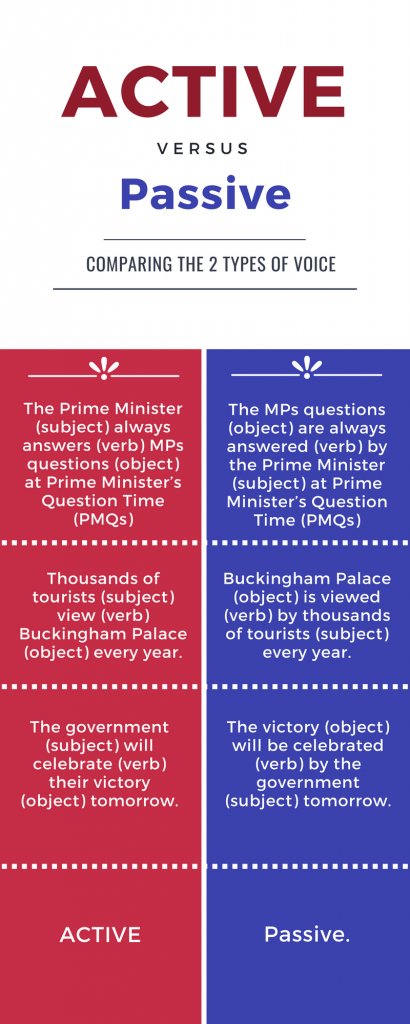

You’ve started typing out your university personal statement, CV or an essay. But, ever had a blank moment when the checker says ‘Passive Voice (consider revising)? Eh? What?
Well, this is flagging up a basic English grammar rule about passive voice vs active voice. When you write, the grammar you choose gives a certain voice. Depending on the construction of your sentence, the voice is either passive or active.
I’m guessing you want your writing to be impactful, clear and persuasive?
If you use active voice your sentences, and writing, will be more efficient and powerful.
In active voice everything revolves around the subject of the sentence. In passive voice the subject is kind of tagged on at the end with usually more words than you really need in the middle.
Other benefits to using Active Voice are:
Do the words ‘be’ and it’s variations of ‘have been’ or ‘being’ feature heavily in your writing? Are they usually followed by a verb in the past tense like ‘spoken’ or ‘finished’? Chances are you’re using passive voice.
Examples are: ‘The speech will be finished soon’ or ‘they have been invited to the manifesto launch.’

Did you notice the pattern? The subject then Verb and then Object. If you want to be confident your sentence is active make sure the subject is doing the acting.
‘Never use the passive where you can use the active’
George Orwell, ‘Politics and the English Language (Penguin Modern Classics)’, 1946
As a principle using the passive voice to create lofty long sentences may make you feel better but it doesn’t help your reader.
Read it out loud. Where’s the subject of that sentence. Does it even have one? If it sounds clunky then it will not ready well and you probably need to change it to the active voice.
But, on occasion, you may feel the need to break up those short sharp sentences or perhaps soften the edges of a sentence. You can also use the passive voice if the subject is unknown. Both of these will be rare.
Politicians use the passive voice to divert blame and to soften hard messages.
The classic is ‘Mistakes were made’ – this does not tell you anything. Who made them? What mistakes? Henry Kissinger, President Clinton, and President George W Bush have used it. In the UK, David Cameron used it in response to alleged UK involvement in torture at Guantanamo Bay.
In 2008, President Obama warned with little clarity, “there will be setbacks.”
Indeed, entire political speeches, usually about President Trump, have been made attacking opponents without even mentioning their name (i.e. the subject of the sentence)
Catch-up soon and feel free to get in touch
Elizabeth
In full disclosure, some of the links are Amazon affiliate links, which means at no cost to you I receive a small commission to put back into the site. I only ever recommend products I believe will be helpful to you.
[apsp-pin-image image_url=’https://www.pinterest.co.uk/pin/293859944438011850/’]